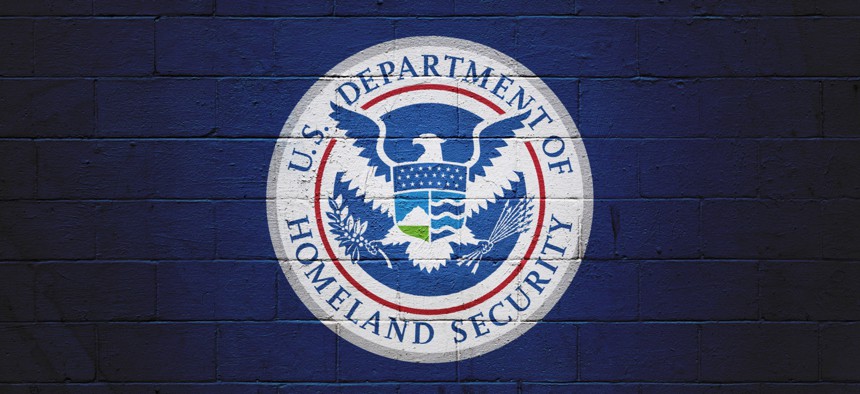
GAO officials said that supervisors at four DHS component agencies had between 6% and 16% lower average chances of discipline than non-supervisor employees. Gwengoat / Getty Images
Some DHS agencies are more likely to discipline employees than supervisors, GAO says
The watchdog said data gaps in the disciplinary adjudication process at four Homeland Security component agencies meant that they were unable to identify why rank-and-file employees were more likely than supervisors to face misconduct judgments.
Employees at four component agencies of the Homeland Security Department were more likely to face disciplinary action than their supervisors, a Government Accountability Office report has found.
But DHS leaders are unable to root out the cause of the statistical disparity because it’s drawn from inconsistent and incomplete data reported from the component agencies.
“We found that supervisors had lower average chances of discipline than non-supervisors at each selected component, ranging from 5.2 to 15.9 percentage points lower when controlling for all feasible factors,” said the GAO report, released Wednesday.
The watchdog examined disciplinary data from the Secret Service, U.S. Customs and Border Protection, U.S. Citizenship and Immigration Services and Federal Emergency Management Agency, finding that because of a lack of detailed expectations and definitions of key terms in the DHS Misconduct Governance Board’s guidance, the information was often not complete or consistent.
GAO officials said that DHS has worked to standardize and better analyze misconduct data, establishing its Misconduct Governance Board in 2020 to “identify, evaluate and implement” misconduct policy improvements across the department.
But an April 2023 analysis of the first quarter’s misconduct data, reported to the DHS Office of the Chief Human Capital Officer from its components, found that the agencies did not report all misconduct allegations because officials said did not know how to interpret key terms from the guidance and were unaware they were supposed to submit all misconduct allegations, including unfounded allegations and cases that resulted in no action.
Because of the inconsistencies, GAO officials said allegation substantiation information wasn’t consistently available in its analysis. DHS’ Misconduct Governance Board also did not require components to report the supervisor status of their misconduct cases in their data.
Despite that, the watchdog found that the difference between non-supervisors and supervisors being disciplined — either through both disciplinary actions, like letters of reprimand or suspensions of 14 days or less, or adverse actions that included longer suspensions, reductions in pay or grade or removal — ranged from 12 to 23 percentage points. The report also found that the majority of misconduct allegations “resulted in no action or informal action for all selected components regardless of supervisory status.”
GAO officials said their analysis showed that the average chance of discipline for supervisors and other employees decreased “after controlling for additional factors relevant to each case of alleged misconduct” and that “unmeasured factors, such as aggravating and mitigating factors,” could explain the difference in frequency in which disciplinary action was administered to the two groups.
But the watchdog also spoke to unions representing employees at CBP, FEMA and USCIS, who said there was “a lack of transparency” in the disciplinary processes at the agencies.
“According to these officials, this lack of transparency results in a perception among bargaining unit employees that disciplinary outcomes between supervisors and non-supervisors are inconsistent and inequitable,” the report said. “Specifically, these officials told us they believe supervisors receive favorable treatment and more lenient penalties.”
Officials at OCHCO, CBP, FEMA and USCIS told GAO that they theorized one reason for the numbers discrepancy is that supervisors were more likely to be subject to unsubstantiated misconduct allegations and warranted taking no action, because “sometimes employees make an allegation because of interpersonal conflicts with their supervisors.”
Despite the proposed explanation, GAO officials noted that “OCHCO is not positioned to validate these reasons or assess differences in disciplinary outcomes by supervisory status because it does not collect or analyze the necessary supervisory data.”
The report offered six recommendations, including three to DHS, citing the need for better documentation of the disciplinary adjudication process at CBP, better analysis of misconduct trends at USCIS, clarifying DHS guidance for misconduct reporting, adding a supervisory status component to the reporting and DHS analysis of it and other information.
DHS concurred with the recommendations, but expressed its concerns with GAO focusing on cases of alleged misconduct, rather than cases of substantiated misconduct. GAO officials noted that “DHS components’ data were not sufficiently reliable for us to include this factor in our analyses.”







